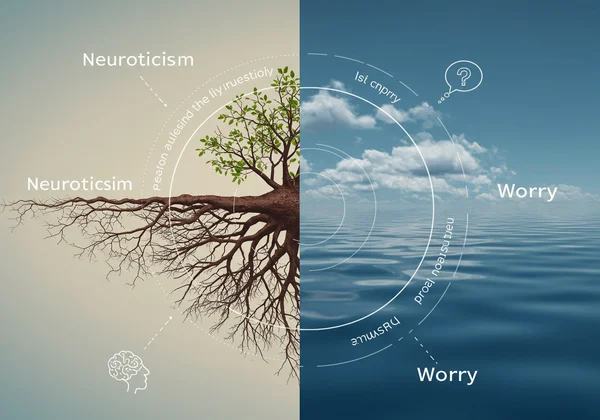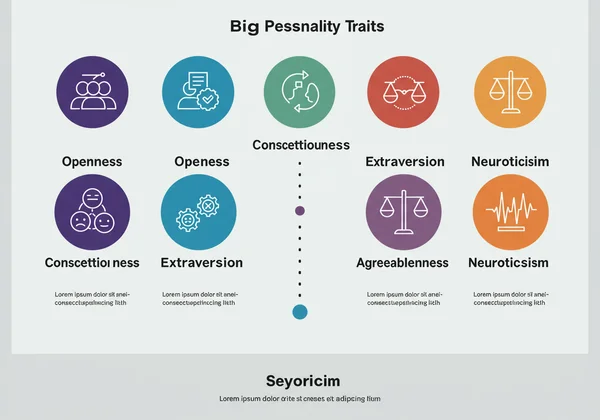神经质测试:我是神经质还是只是个容易担忧的人?
September 7, 2025 | By Alicia Campos
你是否经常质疑自己强烈的情绪是正常的压力反应,还是更深层次的性格特质?许多人难以区分日常的担忧和神经质的性格特质。本指南将帮助你理解其中的细微差别,为你提供清晰的见解,并使你能够更好地评估自己的情绪模式。如果你正在想,“我是神经质还是只是个容易担忧的人?”,理解关键区别是迈向更高自我意识的第一步。一份可靠的 神经质测试 可以为你开启这段旅程提供所需的洞察。你可以参加测试来开始。
神经质与担忧:理解核心区别
乍一看,神经质和担忧似乎是同一枚硬币的两面。两者都涉及焦虑、恐惧和不安的感觉。然而,心理学在稳定的性格特质和短暂的情绪状态之间明确区分了界限。区分它们对于理解你自己的情绪图景和制定有效的应对策略至关重要。

什么是神经质?深入探讨这种性格特质
神经质不是一种疾病或缺陷;它是广为接受的“大五”人格模型中的核心性格特质之一。它代表了一种长期体验负面情绪状态的倾向。神经质水平较高的人更容易感到焦虑、悲伤、易怒和自我意识过强。
可以将神经质想象成一个灵敏度更高的情绪恒温器。神经质程度高的人可能对他人可能不以为然的压力源反应更强烈。这不是一个有意识的选择,而是他们情绪构成的一个基本方面。它指的是一种 倾向,即在各种情况下频繁而强烈地体验负面情绪,而不仅仅是对特定威胁的反应。
解读日常担忧与情境性焦虑
另一方面,担忧是一种普遍的人类体验。它是一种认知过程,关注的是未来那些结果不确定、可能带来负面影响的事件。每个人都会担忧。你可能会担心即将到来的工作面试、一次艰难的谈话,或者你的财务状况。这通常被称为情境性焦虑。
关键区别在于,日常担忧通常与一个特定的、可识别的原因相关。一旦情况解决——你面试成功,谈话顺利——担忧就会消退。它是一种暂时状态,是对外部触发的反应,而不是一种持久的内部倾向。一份情绪稳定性测试可以帮助你澄清你的模式是更符合稳定特质还是情境性反应。
性格特质焦虑:当担忧成为你的一部分
两者之间的界限可能会模糊,从而引出 性格特质焦虑 的概念。这时,担忧的倾向变得如此根深蒂固,以至于感觉像是你永久的一部分。这是神经质的核心——它不仅仅是担心一件事,而是拥有一种基线水平的焦虑,这种焦虑会影响你对世界的感知。
大五人格与神经质:神经质在你的性格中的作用
为了更好地理解神经质,将其置于情境中看待会有所帮助。“大五”模型概述了人格的五个主要维度:
-
开放性:你对新经验的开放程度。
-
尽责性:你的组织性和可靠性。
-
外向性:你如何从社交互动中获取能量。
-
宜人性:你的合作性和同情心。
-
神经质:你如何体验情绪稳定性与不稳定性。

在这个框架内,神经质只是完整人格档案的一个方面。高分不是“坏”,低分也不是“好”。它只是提供了一种描述你自然情绪倾向的语言。了解你的分数可以带来极大的帮助,这就是为什么一份免费神经质测试是如此有价值的自我发现工具。
高神经质的常见特征与倾向
高神经质分数如何在日常生活中表现出来?虽然因人而异,但一些常见模式包括:
-
频繁担忧:纠结于可能出错的事情,通常没有特定的触发因素。
-
情绪波动:情绪频繁变化,从满足到悲伤或易怒。
-
高度自我意识:在社交场合容易感到尴尬或焦虑。
-
压力应对困难:被日常压力压垮,难以从挫折中恢复。
-
悲伤倾向:容易产生内疚、孤独或忧郁的感觉。

识别自己身上的这些模式是第一步。接下来是使用客观工具对其进行量化,以获得更清晰的洞察。
日常压力与神经质:影响的关键区别
区分你所经历的是日常压力还是神经质特质,关键在于其对你生活的影响。虽然两者都可能具有挑战性,但它们的范围和持续时间截然不同。理解这一点可以帮助你决定是否是时候通过正式的神经质评估更深入地探索你的情绪模式。
持续时间、强度和影响范围:识别模式
考虑以下三个因素来帮助区分两者:
- 持续时间:压力通常是短期的,并与特定问题相关。神经质是一种终生、持久的特质。问题解决后,你的焦虑会消退吗,还是会迅速找到新的目标?
- 强度:虽然压力可能很强烈,但神经质程度高的人的情绪反应往往与触发因素不成比例。一个轻微的不便可能感觉像一场重大灾难。
- 影响范围:压力通常局限于其产生的生命领域(例如,工作压力)。神经质的影响范围广,这意味着它会影响你在生活所有领域——工作、人际关系和个人时间——的感受。
两者如何影响日常生活、人际关系和工作
日常压力可能会暂时扰乱你的工作注意力,或在人际关系中造成摩擦。然而,高神经质可能会产生更深远和持久的影响。它可能导致工作中因害怕做出错误选择而长期优柔寡断,或者由于持续担心被拒绝,在人际关系中产生不安全感和嫉妒。它会让人难以享受当下,因为思想总是专注于潜在的未来威胁。这就是为什么获得自我意识对个人成长如此重要。
寻找清晰:何时探索你的情绪模式
如果你读到这里,发现自己认同神经质的描述,那么可能是时候从疑问转向理解了。自我探索并非是为了给自己贴标签,而是为了通过知识来提升自己。了解自己的情绪倾向可以让你与它们协作,而不是对抗它们。
了解你的神经质水平的好处
你为什么要寻求了解你的神经质分数?其益处是巨大的。它可以帮助你:
- 预测触发因素:识别最可能给你带来困扰的情境。
- 发展更好的应对机制:根据你特定的情绪特征调整你的压力管理技巧。
- 改善人际关系:更清楚地向伴侣、朋友和家人表达你的情绪需求。
- 做出更好的职业选择:找到符合你情绪气质的职位和工作环境。
- 培养自我同情心:理解你的情绪敏感性是你的一部分,而不是个人的失败。
参加科学支持的神经质测试
阅读文章是一个很好的开始,但经过科学验证的评估可以提供客观数据。一个旨在衡量神经质的可靠在线人格测试会根据既定的心理模型提出有针对性的问题。我们的 神经质测试 植根于“大五”框架,确保你获得可靠的结果。完成免费测试后,你将立即获得分数,并可以选择解锁由 AI 驱动的深度分析,以获取个性化洞察和可操作的建议。

超越困惑:你的自我意识之路
走向自我意识的旅程通常始于理解日常担忧和根深蒂固的神经质性格特质之间的关键区别。担忧是一种普遍的、暂时的人类体验,但神经质则反映了一种更一致的高度情绪敏感模式,这种模式会影响一个人对世界的感知。神经质程度高本身并没有错——它甚至可能带来优势,比如更强的准备度D和深刻的同理心。
关键在于意识。通过了解你独特的情绪构成,你可以更有效地应对生活的挑战,并培养更大的幸福感。停止疑惑,开始了解。你的自我发现之旅只需点击几下即可。立即发现你的分数,解锁对自己的更深层理解。
关于神经质和担忧的常见问题
我是神经质还是只是焦虑?
这是一个常见问题。焦虑是一种情绪状态,而神经质是一种性格特质,它使你更容易 倾向于 体验焦虑。如果你的焦虑与特定情境相关并在之后消退,那很可能是情境性焦虑。如果你在生活的许多不同领域都感到一种持续的、游离的焦虑感,那可能与较高的神经质有关。一份在线神经质测试可以帮助你澄清这一点。
神经质只是焦虑吗?
不,神经质是一种更广泛的性格特质。虽然焦虑是其核心组成部分,但神经质还包括悲伤、愤怒、内疚和自我意识过强等其他负面情绪的倾向。神经质程度高的人可能不会一直感到焦虑,但他们比分数较低的人更有可能更频繁、更强烈地体验到更广泛的负面情绪。
神经质的人如何行为?
神经质程度高的人可能会表现出几种特征性行为。他们可能会频繁寻求他人的安慰,过度思考决策,并避免他们认为有压力或有风险的情境。他们也可能对自己和他人更加挑剔,并对微小的挫折做出强烈的情绪反应。然而,他们也可能高度富有同理心、富有创造力且尽责,因为他们的敏感性使他们敏锐地意识到潜在问题和他人的感受。要了解你的行为如何契合,你可以开始你的测试。